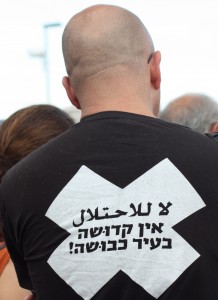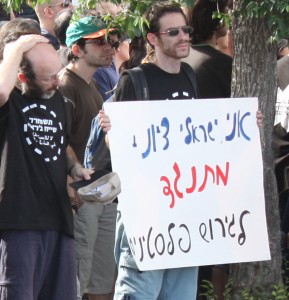Anshel Pfeffer’s article last week against fasting on Tisha Be’Av seemed written for me. I hate to fast. An old friend once told me that on Yom Kippur, he looks at my face in shul to get a real sense of suffering. Enough chastising the flesh. It makes you feel bad.
Pfeffer argued that Tisha Be’Av “has lost any relevance beyond the historical.”
If Tisha Be’Av is meant to mark the exile of the Jewish people, then it’s no longer relevant. For a decade now, there has not been one Jew around the world who was not free to return to Zion. Ever since the quiet exodus of the last Jews of Syria, in the late 1990s, there has not been a country anywhere that has forbidden its Jewish citizens to leave…
As for mourning the Temple,
The only reason that the third temple has not been built is that a majority of Israelis simply are not interested. Secular Jews have no affinity to a priestly caste sacrificing heifers and goats, while the great majority of religious Jews are not very eager themselves.
To which I might add, we should thank God that most religious Jews aren’t interested in slaughtering animals as a means of communicating with the Creator.
Nonetheless, I’m fasting today, and not just out of habit. An email I got just after I read Pfeffers’ article reminded me of why he was mistaken. From the group Sheikh Jarrah: A Just Struggle for a Just Jerusalem, it was an invitation to a discussion on Tisha Be’Av about the destruction of the Temple and the demolition of Palestinian homes. The process of refuting Pfeffer was completed the haftarah on Shabbat morning, by a midrash that I studied with my son, and by the actual discussion of Sheikh Jarrah last night.
Listen, this isn’t really complicated. In the haftarah for the Shabbat before Tisha Be’Av, Isaiah tells the leaders of Israel that they are the chieftains of Sodom. Sodom, everywhere in Jewish tradition from Genesis onward, is the embodiment of injustice. It’s the country where illegal immigrants are brutalized in the public square. In Sodom, it’s a crime to give refuge to people without papers. The “quality of Sodom,” according to the Mishnah, is saying, “What’s mine is mine and what’s yours is yours,” meaning that no one need redistribute wealth. Of Jerusalem that has become Sodom, Isaiah says,
The faithful city
that was filled with justice
where righteousness dwelt –
but now murderers…
Your rulers are rogues
and cronies of thieves
If this sounds to you like history, then it’s not merely that you haven’t wandered about Jerusalem, that you haven’t seen the streets without sidewalks on the occupied side, the mechanical checkpoints processing Palestinians who want to enter, the black-uniformed riot cops keeping peaceful protesters from demonstrating in front of Sheikh Jarrah houses where settlers have evicted Arab residents. You’ve been deliberately skipping past headlines that make you unhappy.
For years, my son and I have been studying midrash on Shabbat. This week we looked at Pesikta on the book of Lamentations. The midrash cites Isaiah. On the words “and now murderers,” it says, “They killed Uriah the priest and Zekhariah.”
The murder of Uriah is in chapter 26 of Jeremiah. Uriah, like Jeremiah, warned of Jerusalem’s destruction. Threatened with the death penalty, he fled to Egypt. In those days, as my son pointed out, Egypt served the function of Paris; that’s where dissidents went into exile. The king’s hit squad found him and brought him back. After all, he was disloyal. Maybe he got funding from the European Union, or his prophecy was cited in the Goldstone Report, or he refused to buy products from settlements.
So I went to the discussion last night. It was held at Hebrew Union College, but it was hard to find the room. I figure that some people who wanted to come gave up and left. Nonetheless, there were well over a hundred people packed into the room; the organizers had expected twenty. I’m sorry; I didn’t take a voice recorder or notebook. I went for myself, not to report. One of the speakers noted the rabbinic principle that “prophecies were given for all generations” – meaning that only those warnings that have relevance for now were written down and preserved in the Bible.
The speakers spoke in terms of Judaism. The room was crowded. The crowd, as much as I could judge from looks, was mostly religious. They were there because they hadn’t given up on the country or on our religion.
On fast days, during services, sometimes someone will pass around spices or mint leaves to keep up your spirits. In the crowded room, on a day of mourning, there was a fragrance of hope and renewal.
…Why then did this fool Isaiah
smelling vaguely of wilderness himself
why did he shout,Your country is desolate?
…And while Isaiah gently hums a sound
to make the guilty country uncondemnedall men, truthfully desolate and lonely
as though witnessing a miracle
behold in beauty the faces of one another.— Leonard Cohen, “Isaiah”








This is beautiful. I wish I had gone to the discussion last night.
While fasting, take comfort in the fact that you’re not a Karaite: they fasted on both the 7th and 10th of Av.
I try not to be sentimental here, but the Sheikh Jarrah cases are really heartbreaking. It’s telling that many of my friends on the Right haven’t been able to bring themselves to defend what’s going on: Even if the documents owned by the Va’ad Haedah Hasfardit and its co-appellees are genuine, which is by no means clear (and remember: המוציא מחברו עליו הראיה), it still remains the case that East Jerusalem Palestinians have no legal means of re-acquiring the properties they owned prior to 1948. And in fact, the issue shouldn’t be a left-right one at all; it’s totally orthogonal to whether you think Bibi should acquiesce to direct talks. Thanks for writing about this, Gershom.
I also have to flag this by Pfeffer:
Really, that’s the only reason? Really?
Actually, apparently a large plurality of Israelis want to rebuild the Temple. Not sure exactly what to think about that.
As Amos Goldberg pointed out at the discussion last night, the Sheikh Jarrah issue is kind of a no-brainer; by expropriating the householders, we’re making refugees once more out of resettled ex-refugees. For years, I’ve heard people lambast the Arab countries for not doing more to help the Palestinian refugees resettle. But that’s exactly what the Jordanian government and UNRWA did in this case. So now our government is giving the lie to its own case.
Incidentally, most of the houses that are being appropriated were built by the resettling agencies or the new owners; it’s the land that was (apparently) bought by Jews in the 19th century.
Israel’s solution is for Israelis. I bow.
So although the centuries of injustices, in a sense, are no longer (Pfeffer), still GG you are saying there is a worthwhile need to fast, and maybe also lament, but more to transpose this holiday for our time- this is what I read you saying: that being together in that room on that occasion and making something today or now from it, (ir with re Sheikh Jarrah) breathes life into Tisha B’av and Judaism, making it a living religion. Those who crowded in, are people who maybe desperately want to make Judaism a living meaningful just path.
You take as a given and use presumably wise rabbinical mandates, ( or you make/keep them wise) and use events of the past ( and maybe myth) to meditate on today… to derive lessons, group meditation leading to uplift.
I, too, think that Tisha B’Av is reason to mourn and fast, though from a different perspective.
There is reason to fast for Jews to understand and know their history: that annexation of East Jerusalem by Jordan in 1948 does not establish a legal Jordanian sovereign in that area, that the 1967 re-take by Israel is not occupation, – contrary to the narrative Palestinians are trying to force down the world’s throat – therefore arguing that it’s only a case of “Arab countries helping Palestinian refugees to resettle” is false from the start, because East-Jerusalem was never legally part of any Arab state to begi with.
I fast for Jews not to take upon themselves a false feeling of guilt, and never to forget what Jerusalem, as a whole, means to our nation.
To “we should thank God that most religious Jews aren’t interested in slaughtering animals as a means of communicating with the Creator”.
Just to eat well, though, is a good reason. And even to barbecue the meat. The things we have to compromise for: no Temple but lots of beef.
What I did on Tisha B’Av:
http://myrightword.blogspot.com/2010/07/tisha-bav-in-machkama.html